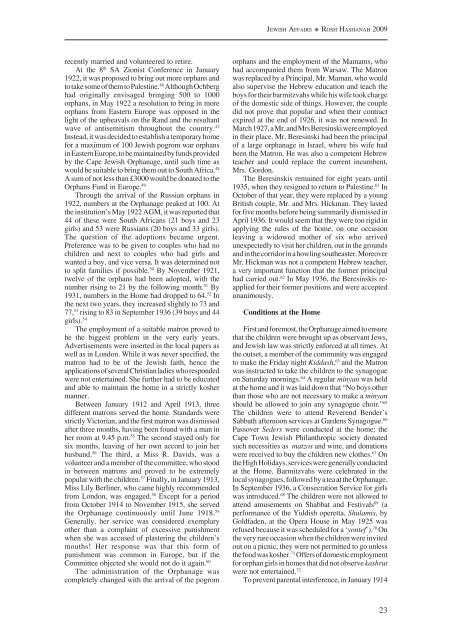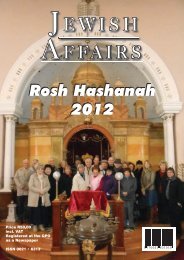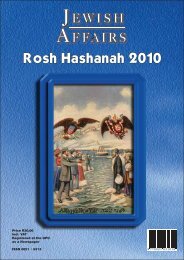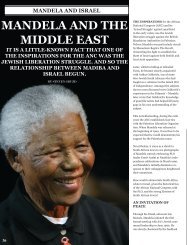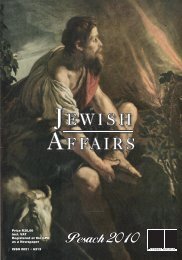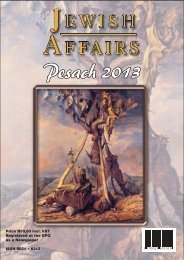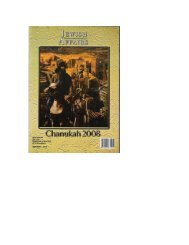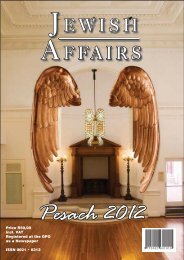Rosh Hashanah 2009 - South African Jewish Board of Deputies
Rosh Hashanah 2009 - South African Jewish Board of Deputies
Rosh Hashanah 2009 - South African Jewish Board of Deputies
- No tags were found...
You also want an ePaper? Increase the reach of your titles
YUMPU automatically turns print PDFs into web optimized ePapers that Google loves.
JEWISH AFFAIRS ROSH HASHANAH <strong>2009</strong>recently married and volunteered to retire.At the 8 th SA Zionist Conference in January1922, it was proposed to bring out more orphans andto take some <strong>of</strong> them to Palestine. 46 Although Ochberghad originally envisaged bringing 500 to 1000orphans, in May 1922 a resolution to bring in moreorphans from Eastern Europe was opposed in thelight <strong>of</strong> the upheavals on the Rand and the resultantwave <strong>of</strong> antisemitism throughout the country. 47Instead, it was decided to establish a temporary homefor a maximum <strong>of</strong> 100 <strong>Jewish</strong> pogrom war orphansin Eastern Europe, to be maintained by funds providedby the Cape <strong>Jewish</strong> Orphanage, until such time aswould be suitable to bring them out to <strong>South</strong> Africa. 48A sum <strong>of</strong> not less than £3000 would be donated to theOrphans Fund in Europe. 49Through the arrival <strong>of</strong> the Russian orphans in1922, numbers at the Orphanage peaked at 100. Atthe institution’s May 1922 AGM, it was reported that44 <strong>of</strong> these were <strong>South</strong> <strong>African</strong>s (21 boys and 23girls) and 53 were Russians (20 boys and 33 girls).The question <strong>of</strong> the adoptions became urgent.Preference was to be given to couples who had nochildren and next to couples who had girls andwanted a boy, and vice versa. It was determined notto split families if possible. 50 By November 1921,twelve <strong>of</strong> the orphans had been adopted, with thenumber rising to 21 by the following month. 51 By1931, numbers in the Home had dropped to 64. 52 Inthe next two years, they increased slightly to 73 and77, 53 rising to 83 in September 1936 (39 boys and 44girls). 54The employment <strong>of</strong> a suitable matron proved tobe the biggest problem in the very early years.Advertisements were inserted in the local papers aswell as in London. While it was never specified, thematron had to be <strong>of</strong> the <strong>Jewish</strong> faith, hence theapplications <strong>of</strong> several Christian ladies who respondedwere not entertained. She further had to be educatedand able to maintain the home in a strictly koshermanner.Between January 1912 and April 1913, threedifferent matrons served the home. Standards werestrictly Victorian, and the first matron was dismissedafter three months, having been found with a man inher room at 9.45 p.m. 55 The second stayed only forsix months, leaving <strong>of</strong> her own accord to join herhusband. 56 The third, a Miss R. Davids, was avolunteer and a member <strong>of</strong> the committee, who stoodin between matrons and proved to be extremelypopular with the children. 57 Finally, in January 1913,Miss Lily Berliner, who came highly recommendedfrom London, was engaged. 58 Except for a periodfrom October 1914 to November 1915, she servedthe Orphanage continuously until June 1918. 59Generally, her service was considered exemplaryother than a complaint <strong>of</strong> excessive punishmentwhen she was accused <strong>of</strong> plastering the children’smouths! Her response was that this form <strong>of</strong>punishment was common in Europe, but if theCommittee objected she would not do it again. 60The administration <strong>of</strong> the Orphanage wascompletely changed with the arrival <strong>of</strong> the pogromorphans and the employment <strong>of</strong> the Mamams, whohad accompanied them from Warsaw. The Matronwas replaced by a Principal, Mr. Maman, who wouldalso supervise the Hebrew education and teach theboys for their barmitzvahs while his wife took charge<strong>of</strong> the domestic side <strong>of</strong> things. However, the coupledid not prove that popular and when their contractexpired at the end <strong>of</strong> 1926, it was not renewed. InMarch 1927, a Mr. and Mrs Beresinski were employedin their place. Mr. Beresinski had been the principal<strong>of</strong> a large orphanage in Israel, where his wife hadbeen the Matron. He was also a competent Hebrewteacher and could replace the current incumbent,Mrs. Gordon.The Beresinskis remained for eight years until1935, when they resigned to return to Palestine. 61 InOctober <strong>of</strong> that year, they were replaced by a youngBritish couple, Mr. and Mrs. Hickman. They lastedfor five months before being summarily dismissed inApril 1936. It would seem that they were too rigid inapplying the rules <strong>of</strong> the home, on one occasionleaving a widowed mother <strong>of</strong> six who arrivedunexpectedly to visit her children, out in the groundsand in the corridor in a howling southeaster. MoreoverMr. Hickman was not a competent Hebrew teacher,a very important function that the former principalhad carried out. 62 In May 1936, the Beresinskis reappliedfor their former positions and were acceptedunanimously.Conditions at the HomeFirst and foremost, the Orphanage aimed to ensurethat the children were brought up as observant Jews,and <strong>Jewish</strong> law was strictly enforced at all times. Atthe outset, a member <strong>of</strong> the community was engagedto make the Friday night Kiddush, 63 and the Matronwas instructed to take the children to the synagogueon Saturday mornings. 64 A regular minyan was heldat the home and it was laid down that “No boys otherthan those who are not necessary to make a minyanshould be allowed to join any synagogue choir.” 65The children were to attend Reverend Bender’sSabbath afternoon services at Gardens Synagogue. 66Passover Seders were conducted at the home; theCape Town <strong>Jewish</strong> Philanthropic society donatedsuch necessities as matzos and wine, and donationswere received to buy the children new clothes. 67 Onthe High Holidays, services were generally conductedat the Home. Barmitzvahs were celebrated in thelocal synagogues, followed by a tea at the Orphanage.In September 1936, a Consecration Service for girlswas introduced. 68 The children were not allowed toattend amusements on Shabbat and Festivals 69 (aperformance <strong>of</strong> the Yiddish operetta, Shulamis, byGoldfaden, at the Opera House in May 1925 wasrefused because it was scheduled for a ‘yontef’). 70 Onthe very rare occasion when the children were invitedout on a picnic, they were not permitted to go unlessthe food was kosher. 71 Offers <strong>of</strong> domestic employmentfor orphan girls in homes that did not observe kashrutwere not entertained. 72To prevent parental interference, in January 191423


